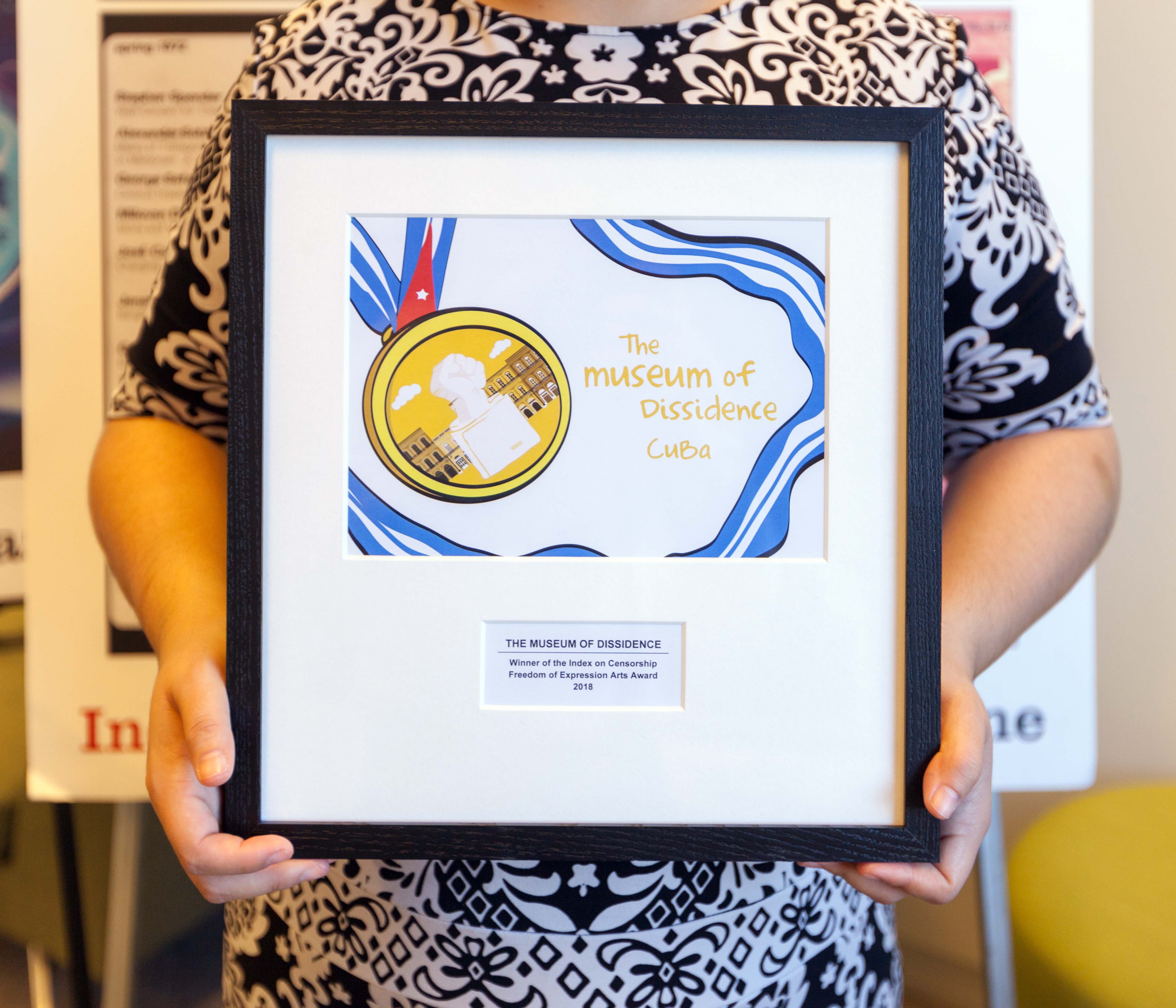[vc_row][vc_column][vc_video link=”https://youtu.be/-UpVto-2Sf0″][vc_column_text]The UK has refused visas for a second time to two award-winning Cuban artists who had been invited to take up a two-week artistic residency.
Luis Manuel Otero Alcántara and Yanelys Nuñez Leyva, winners of this year’s Index on Censorship Freedom of Expression Awards for Arts, had also been due to collect their award. They had been scheduled to receive their honour in April at the Index award ceremony in London but were denied visas to attend.
“We had hoped that – having been recognised with this award, and given the fact Luis Manuel and Yanelys have been granted visas to Argentina, Chile, the Czech Republic, and the United States this year – the UK government would give them the opportunity to visit the UK,” said Index on Censorship Fellowships and Advocacy Officer Perla Hinojosa.
Alcántara and Nunez are founders of The Museum of Dissidence, a public art project and website celebrating dissent in Cuba. Set up in 2016, the museum organises radical public art projects and installations, concentrated in the poorer districts of Havana.
Last month, Cuban authorities arrested Nuñez and Alcantara for their role in organising a concert against Decree 349, a vague law that will give the government more control over the display and exchange of art. The law, due to come into force on 1 December 2018, gives the Ministry of Culture increased power to censor, issue fines and confiscate materials for work of which they do not approve. The pair were beaten during their detention.
It was the second arrest in three weeks for Alcantara in relation to Decree 349.
“The UK makes much of its support for freedom of expression,” said Index on Censorship chief executive Jodie Ginsberg. “But while it talks the talk, it fails to walk the walk. Denying visas to artists who have faced oppression in their own countries for speaking out simply emboldens the oppressor.”
In August, directors of some of Britain’s biggest festivals signed a letter calling for the government to make its “overly complex” visa application process more transparent, after a surge in refusals and complications for authors, artists and musicians invited to perform in the UK.
Signatories of the letter included Nick Barley, the director of Edinburgh international book festival, and Chris Smith, the director of Womad after both went public with their festivals’ attempts to get visas for authors and musicians.
Yana Peel, CEO of the Serpentine Galleries and a judge of this year’s Freedom of Expression Awards said: “This is extremely disappointing news. Artists from overseas are being unfairly treated by the current visa system and it is beginning to have a significant impact on our programmes and events. In today’s climate, it is especially important that artists coming to Britain know that they are welcome.”
Nunez and Alcantara – who had been due to take up a two-week residency with Metal in Southend – were refused their visas on the grounds of insufficient evidence they would be able to support themselves financially during their stay.
“That’s nonsense,” said Hinojosa. “We provided ample evidence of the support they would receive and that Index would stand as guarantor. We have run our awards for nearly 20 years and never had any of our winners overstay or breach their visa terms.”
Colette Bailey, CEO and Artistic Director of Metal, said: “We are incredibly disappointed not to be welcoming Nunez and Alcantara to the UK as part of our International Artists in Residence programme. Our artists in residence programme is a platform for the exchange of ideas, culture and knowledge between artists from around the world and our local communities and young people. It is activity like this that contributes to the creativity of Britain, across sectors, and our enviable reputation as a creative powerhouse. This refusal is part of a worrying trend that cannot go unchallenged.”
In 2016, Index complained to UK authorities after UK border officials confiscated the passport of Syrian journalist, Zaina Erhaim who had been invited in her capacity as that year’s winner of the Freedom of Expression Award for journalism to speak at an event alongside veteran journalist Kate Adie.[/vc_column_text][/vc_column][/vc_row][vc_row][vc_column][vc_basic_grid post_type=”post” max_items=”12″ style=”load-more” items_per_page=”4″ element_width=”6″ grid_id=”vc_gid:1537976994705-c0f32970-0b8a-0″ taxonomies=”23772″][/vc_column][/vc_row]






